Supreme Court Quashes Bihar’s SC List Amendment: Tanti-Tantwa Merger Declared Unconstitutional
- NITU KUMARI
- 3 June 2025

The Supreme Court of India ruled that only Parliament can amend the Scheduled Castes (SC) list under Article 341, striking down Bihar‘s resolution to include the Tanti caste. Read the full case analysis and its implications on caste-based reservations.
Introduction
On July 15, 2024, the Supreme Court of India delivered a landmark ruling in the case Dr. Bhim Rao Ambedkar Vichar Manch Bihar, Patna vs. The State of Bihar & Others. The case challenged a 2015 notification by the Bihar government attempting to move the Tanti-Tantwa caste from the Extremely Backward Class (EBC) category to the Scheduled Castes (SC) list.
The Court found this action unconstitutional, affirming that such changes can only be made by Parliament under Article 341 of the Constitution of India.
Case Details at a Glance
Case Name: Dr. Bhim Rao Ambedkar Vichar Manch Bihar, Patna vs. State of Bihar & Others
Judgment Date: July 15, 2024
Citation: 2024 INSC 528
Presiding Judges: Hon’ble Justices Vikram Nath and Prashant Kumar Mishra
Background and Context
State Action in 2015
On July 1, 2015, the Government of Bihar issued a resolution to move the Tanti-Tantwa caste from the EBC category to the SC list, citing cultural and historical similarity with the Pan/Sawasi caste.
Legal Challenge
Petitioners argued the move violated Article 341 of the Constitution, which gives only the Parliament of India the power to modify the Scheduled Castes list. Despite this, the Patna High Court upheld the state’s action, prompting the appeal to the Supreme Court.
Key Legal Issues
Does the State Government have the authority to change the SC list under Article 341?
Is the classification of Tanti-Tantwa as synonymous with Pan/Sawasi justified?
Can a state extend SC benefits through a notification without parliamentary approval?
Arguments Presented
Petitioners’ Arguments
Violation of Article 341: Only Parliament has authority over SC list amendments.
Rejection by Registrar General of India: The RGI had already rejected the state’s 2011 recommendation.
Mala Fide Intent: Petitioners claimed it was a political move to bypass constitutional procedure.
Non-Severability: The removal from EBC and addition to SC were inseparable and both must be invalidated.
Respondent’s Defense
Clarification, Not Amendment: The State claimed the move was merely a clarification about caste synonymy.
Commission Recommendations: It followed the State Backward Commission’s recommendations.
Ethnographic Support: Previous reports claimed Tanti-Tantwa was similar to Pan/Sawasi.
Supreme Court Verdict
Judgment Summary
Justice Vikram Nath delivered the judgment, ruling that only Parliament of India can make changes to the SC list. The notification issued by the Bihar Government was found to exceed state powers and was declared unconstitutional.
Union Government’s Position
The Ministry of Social Justice and Empowerment supported the petitioners, stating that Tanti-Tantwa is not listed under Bihar’s SC list. It had repeatedly advised the state against issuing SC certificates to members of this caste.
Key Takeaways
Ratio Decidendi
Only Parliament has the power to alter Scheduled Caste lists under Article 341.
Obiter Dicta
The Court stressed the necessity of respecting constitutional processes to avoid abuse of reservation policies.
Guidelines Issued
SC quota jobs held by Tanti-Tantwa individuals must be reassigned.
The caste will return to its EBC status.
No recovery of previous benefits due to the State’s mistake.
Conclusion
This landmark ruling reinforces the constitutional principle that state governments cannot independently amend the Scheduled Castes list. It protects the integrity of India’s reservation system, ensuring that affirmative action is implemented fairly and lawfully.
By quashing the Bihar government’s 2015 notification, the Supreme Court of India has upheld the constitutional process and safeguarded the rights of genuinely marginalized communities.
Case Laws






